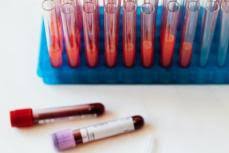
日本人造血液:無論血型如何都可以注射
・奈良醫科大學成功開發人工紅血球
・重複利用過期的捐獻血液
我們將為您提供在RecordChina上發表的文章摘要。

Korea, Money Today: July 5, 2024
Japan has developed the world’s first artificial blood that can be administered to anyone regardless of blood type.
Nara Medical University has succeeded in developing red blood cells that carry oxygen in the blood.
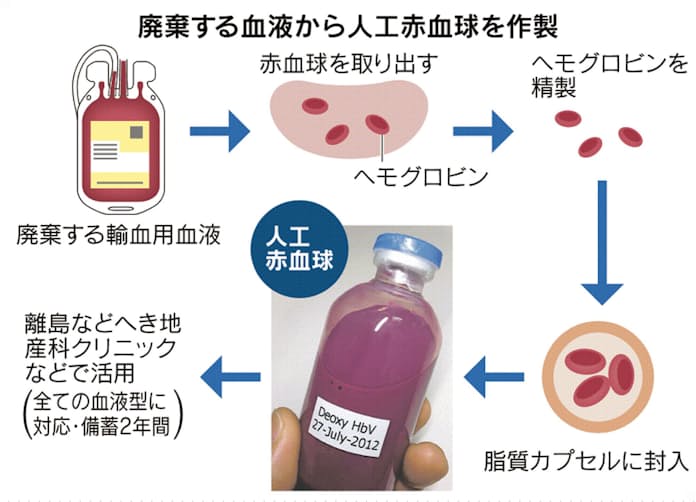
Japan develops artificial blood:
1. Extract only hemoglobin from discarded donated blood.
2. Wrap it in a lipid membrane and administer it in the form of a capsule.
Researchers involved in the development:
Commented that it can contribute to the health and welfare of humanity.
1. The greatest advantage is that it can be administered to anyone regardless of blood type.
2. It can be used on any patient or injured person, regardless of blood type.
If a patient can survive on this artificial blood for even just an hour,
they can be transported to a hospital during that time and given the next step.
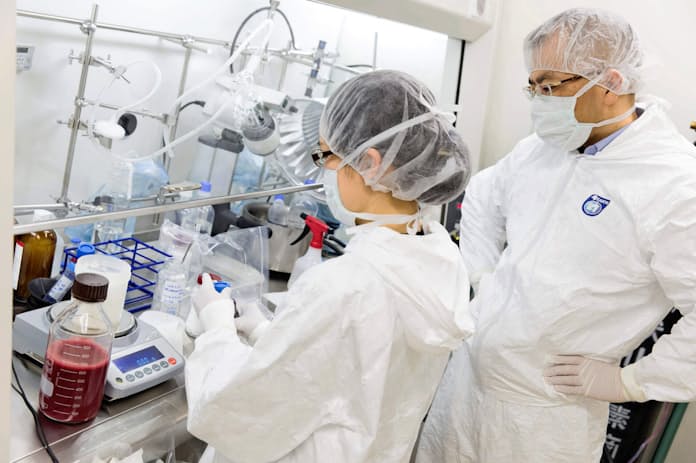
Nara Medical University:
Clinical trials will begin in earnest next year, with the aim of commercialization within five years.
Artificial blood shelf life:
1. Real blood can be stored for four weeks when refrigerated.
2. Artificial blood has a long shelf life of two years at room temperature and five years when refrigerated.
Doctor helicopters and ambulances:
If it is installed on doctor helicopters and ambulances, it will be possible to save patients’ lives on remote islands and in difficult-to-access areas.

Korean netizen’s reaction:
“Wow, Japan! We’ve finally reached the age where blood can be made.”
“I hate Japan, but Korea should learn from this.”
“Korean doctors only think about cosmetic surgery and skin massage.”
“Korean medical professors only think about demonstrations.”
Lamenting the current situation in Korea:
There have been many voices praising Japan and lamenting the current situation in Korea.
There is not much difference between Japan and Korea in terms of medical schools and medical policies.
The awareness of Korean politicians and doctors is behind that of Japan.
https://www.recordchina.co.jp/b936588-s39-c30-d0195.html
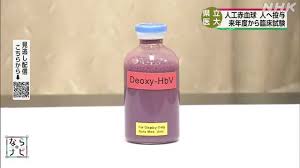
Japan: Aiming for practical application of artificial red blood cells
-Nara Medical University to start clinical trials of artificial blood-
Summary from NHK News article.
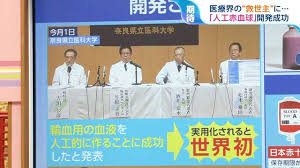
Nara Medical University:
Professor Sakai’s research group held a press conference to announce the results.
1. Reuse blood collected through blood donations that has expired.
2. Professor Sakai Hiromizu’s research group has created artificial red blood cells.
Full-scale clinical trials:
– Clinical trials to confirm safety and effectiveness by administering to humans
1. It has been announced that full-scale clinical trials will begin next year.
2. If put into practical use, it will make up for the shortage of blood for transfusions.
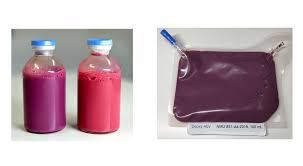
“Artificial red blood cells” created:
The research group has artificially created red blood cells that carry oxygen throughout the body.
1. Donated blood that has expired by one month will be used.
2. Only the components of red blood cells are extracted and wrapped in an artificial membrane.
Full-scale clinical trials will begin next year to confirm safety and effectiveness.
Storage of “artificial red blood cells”:
1. Regular red blood cells for transfusions must be stored refrigerated.
2. The “artificial red blood cells” can be stored at room temperature for two years.
Post-processing of donated blood:
Currently, donated blood is separated into red blood cells, platelets, and plasma components.
1. After separation, blood products for transfusion are manufactured.
2. However, the validity period of red blood cell products is 28 days after blood collection.
Current clinical trial:
1. In this clinical trial, the drug will be administered to 16 healthy people.
2. After that, the group will increase the number of people who will be administered the drug.
We hope to commercialize the drug within 10 years.
Decrease in blood donations from young people:
In recent years, blood donations from young people have been decreasing.
In the past 10 years, blood donations from people under 30 have decreased by about 30%.
If the low birth rate and aging population continues to progress, there is a risk of a shortage of blood products.